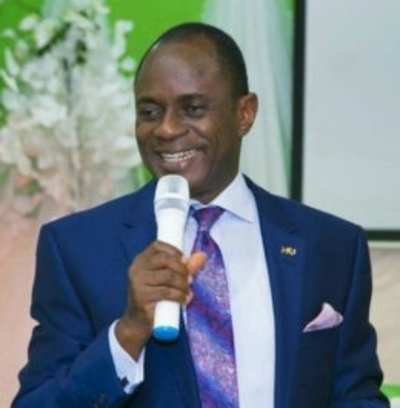News
Ex-NITDA Director Kemabonta Joins African ICT Foundation Executive Council

Dr. Inyi kemabonta, former director of Standards and Regulation in Nigeria Information and Technology Development Agency (NITDA) and a World Bank Consultant on Nigeria’s Digital Economy, has joined the Executive Council of the African ICT Foundation (AfICTF) as Policy and Regulatory Affairs Director.
According to a statement from Mr. Tony Ojobo, president of the Foundation and Chairman of the Board of Trustees, announcing his appointment, Kemabonta will amongst other functions provide vision and leadership in the development of AfICTF’s strategy and policy work concerning ICT Policy in Africa and include regular speaking engagements at industry conferences/events globally for the Foundation.
He said Kemabonta was appointed into the Executive Council of the Foundation in line with the existing template of appointment introduced by the founders of the Foundation in 2009 following nomination by watchers of the ICT/Telecoms industry in Africa.
Kemabonta is an Information Technology Attorney, Consultant, Public Speaker and Trainer. Over the last two decades he worked in both the Legislative and Executive Arms of government during which he chaired and served on several developmental initiatives in the Nigeria ICT industry including the Federal Government program on ICT innovation and entrepreneurship in 2012.
He helped to develop several policies and regulations, among which is the Local Content Initiative in ICT, which have shaped the Nigerian ICT industry.
He has worked on several pieces of legislation for the Nigerian government, such as the Cybercrime Bill, Electronic Transaction Bill, Public Key Infrastructure Regulation, Data Protection Bill, and the NITDA Act of 2007.
He has represented the Nigerian government at several international technology events, including ICANN.
His pioneering work, along with other professionals,in the ICT space for the Nigerian government helped in the establishment of the Nigerian National Information Technology Development Agency (NITDA), the Nigerian Internet Registration Association (NiRA) and several industry platforms in ICT.
Kemabonta was the Director of Standards and Regulation in NITDA until 2014. He was also the pioneer National Coordinator of the Office for Nigerian Content in ICT during which he set up and implemented the legal and institutional framework for the development of an indigenous ecosystem in ICT across the spectrum of human capital, infrastructure, software, hardware and services.
He has a deep understanding of the workings of Information Technology in the Public Sector
In his acceptance letter to the Board, he said Africa has so much potential and opportunities in ICT saying that Information Technology Regulation and Policy Development are areas where a lot can be achieved in a short time and in a sustainable manner.
“I am eager to begin work on a pet project: Africa’s Digital Transformation through Regulation and Policy Development” using my position as a Director. Nigeria might be a good starting point for the project. An aspect of the project is “Computer in Every Home Campaign” which I am eager to kick start as soon as possible”, he said.
He currently consults for the World Bank on Nigeria’s Digital Economy, and is a Regional Representative of AfICTA on the African Union Policy and Regulation Initiative for Digital Africa (PRIDA) train-the-trainer program.
Apart from ICT, Law and Behavioural Sciences, his professional and academic background includes Communication, Industrial Relations and Human Capital Development.
He conducts trainings in Transformational Leadership, ICT Regulation, Business and Developmental Communication, Negotiation Skills and Knowledge Management.
News
PalmPay Launches N400 Million World Travel Carnival, Rewarding Users with Free Global Trips

PalmPay, Nigeria’s leading digital banking platform, has announced the launch of its ₦400 million festive rewards campaign, designed to reward users with cash prizes and fully sponsored international travel experiences for everyday transactions on the PalmPay app.

The campaign will run from December 17, 2025, to January 8, 2026. The campaign is designed to reward everyday transactions with extraordinary experiences. It runs alongside PalmPay’s Purple December brand campaign, which focuses on wrapping up the company’s key brand and community initiatives for the year.
At the centre of the rewards campaign is the PalmPay World Travel Carnival, an interactive card collection experience that allows users to earn city cards by completing transactions on the app. Users are required to collect five city cards – London, New York, Dubai, Sydney, and Cape Town and combine them into a World Card, which unlocks a share of the prize pool.
The more World Cards a user creates, the larger their share of the cash rewards. Any extra uncombined cards can be swapped with friends and other PalmPay users to help complete additional World Cards.
Beyond cash rewards, the Carnival also offers Free Global Trips. In each round, the top two users with the highest number of eligible transactions (₦100 and above) and at least one World Card will win an all-expense-paid international trip.
The travel grand prize covers:
- Visa fees
- Round-trip international airfare
- 5-day, 4-night hotel accommodation
- Side attraction
- Meal expenses
- Airport pick-up and drop-off
- All transportation for scheduled tour activities during the trip
Winners will be determined through a transparent leaderboard system, with prizes credited automatically at the end of each round on December 25, December 31, and January 8.
Participation is simple:
- Complete tasks on the PalmPay app, such as Airtime, Data, Transfers, and other specific transactions listed in the app, to earn cards.
- Collect all five city cards.
- Swap cards with friends to complete your collection.
- Combine cards to form a World Card and earn cash rewards.
- Perform more transactions to climb the leaderboard for a chance at the global trip prize.
To ensure fairness, PalmPay has instituted strict rules: no cheating, bots, fake accounts, or manipulation. Any violations may lead to disqualification or account bans. Additionally, the Free Travel Prize is limited to one per user throughout the campaign.
Speaking on the launch, Femi Hanson, Head of Marketing & Communication, “This festive rewards campaign is about turning everyday banking into meaningful value for our users. With the World Travel Carnival as the headline activation, we are reinforcing PalmPay’s promise of being the smarter way to bank—where smart financial decisions unlock bigger opportunities.”
News
REA, NBS Partner to Deliver Comprehensive Energy Data for Nigeria

The Rural Electrification Agency (REA) and the National Bureau of Statistics (NBS) have signed a Memorandum of Understanding (MoU) to conduct a nationwide energy survey aimed at closing long-standing data gaps in Nigeria’s power sector. The initiative is expected to guide policy, attract investment, and accelerate universal electricity access.

Signed in Abuja, the agreement establishes a National Energy Survey based on the Multi-Tier Tracking Framework (MTF), a globally recognized methodology that measures electricity access not only by grid connection but also by quality, affordability, reliability, and usage of electricity and clean cooking solutions.
The survey will be implemented under the Energy Sector Management Assistance Program (ESMAP) of the World Bank. Dr. Abba Aliyu, REA Managing Director/CEO, said the partnership underscores REA’s commitment to evidence-based rural electrification planning and will generate detailed insights on electricity access and off-grid solutions nationwide.
Prince Adeyemi Adeniran, Statistician-General of the Federation/CEO of NBS, emphasized that reliable statistics are essential for effective policymaking, assuring that NBS will provide technical oversight, sampling expertise, and quality assurance to meet global standards.
The survey will assess energy access, household affordability, expenditure patterns, and the adoption of off-grid technologies such as solar home systems, mini-grids, and clean cooking solutions. REA will provide sector expertise and policy alignment, while NBS manages regulatory approvals, methodology, and technical supervision.
Funded and technically overseen by the World Bank, the exercise will run for 18 months, with the resulting data expected to improve national energy planning, programme targeting, and private sector investment, particularly in underserved and rural communities.
Officials said the collaboration reflects the Federal Government’s commitment to strengthening inter-agency coordination, enhancing energy data availability, and advancing Nigeria’s goal of universal electricity and clean cooking access.
News
SiBAN New Executive Council to Champion Vision for Nigeria’s Digital Economy

The Stakeholders in Blockchain Technology Association of Nigeria (SiBAN), the nation’s foremost self-regulatory body for the blockchain industry, has completed its election cycle, heralding the beginning of a new executive council dedicated to scaling Nigeria’s digital economy.

The highly anticipated elections concluded recently with the emergence of a new leadership team poised to champion industry standards, foster innovation, and drive widespread adoption of blockchain technology across the country.
The newly elected executives, who will officially assume their roles in January 2026, represent a blend of legal, financial, and technical expertise critical for navigating the evolving regulatory landscape.
Leading the charge is Mela Claude-Ake, a lawyer, who has been elected the President of SiBAN to succeed the outgoing President, Obinna Iwuno, whose tenure was marked by significant achievements, including facilitating crucial reforms and forging strategic partnerships with regulators and other critical stakeholders in the digital asset industry. Mr. Iwuno will formally hand over the reins to the new council in January 2026.
Other elected to the executive council are Chimene Chinah – Vice President 1, in charge of Blockchain education and adoption; Oroke Cornelius – Vice President 2, in charge of membership, strategic partnerships, and funding; and Ayo Shonibare – Vice President 3, in charge of policy, regulation, and ethics.
Others are Ugochukwu Peters – Vice President 4 in charge of digital asset operations and capital markets, Mbene Vivian – Chief strategy officer in charge of projects and incubation, Olufunmilayo Tugbobo as Financial Secretary/Chief Financial Officer, and Chiemeka David Ohajionu as Chief Communications Officer.
The newly elected council’s structure reflects SiBAN’s commitment to addressing key pillars of the blockchain ecosystem: from grassroots education and fostering innovation through projects, to establishing robust regulatory frameworks.
In his acceptance speech, Mela Claude-Ake emphasized the vital role SiBAN plays in shaping the future of finance and technology in Nigeria.
“The trust placed in this new council is not one we take lightly. We inherit a great foundation built by the outgoing team. Our mission now is to accelerate. We stand at a critical juncture where the potential of blockchain to revolutionize every sector, from finance and governance to supply chain, is undeniable. This new council will focus relentlessly on advancing smart, collaborative regulation, democratizing blockchain education, and protecting the interests of all stakeholders to ensure that Nigeria remains a leader in the African digital economy space,” he assured.
He added that he is humbled by the opportunity to be the face of one of Nigeria’s youngest and most promising sectors — blockchain tech.
“As a tech enthusiast I am excited at the possibilities. The ecosystem needs careful nurturing by the government. My administration will be focused on building new bridges for the blockchain sector internationally and domestically, establishing trust with the public and unifying the sector. I enjoin all blockchain stakeholders in Nigeria, connected to Nigeria or of nigerian heritage to join hands together with my administration in building the industry of our dreams.”
The industry now looks forward to the handover ceremony in January 2026 and the initiatives the new SiBAN leadership will unveil to solidify the association’s role as a catalyst for innovation and a respected partner to the Nigerian government.

 News3 days ago
News3 days agoSiBAN New Executive Council to Champion Vision for Nigeria’s Digital Economy

 E-Financial3 days ago
E-Financial3 days agoTax Reform or Financial Exclusion? The Trouble with Mandatory TINs

 Telecom3 days ago
Telecom3 days agoNCC Blames NOGASA for Abuja Outage

 General News3 days ago
General News3 days agoNITDA DG Calls for Innovation-Led Economic Rebirth @ Kano Startup Weekend

 Telecom2 days ago
Telecom2 days agoAirtel Africa Partners Starlink to Launch Direct-to-cell Service in 14 Markets

 E-Business2 days ago
E-Business2 days agoCheck Point Reveals Nigeria as Second Most Targeted African Country for Cyberattacks in November

 News3 days ago
News3 days agoAPC National Chairman Appoints Mr. Abimbola Tooki as Special Adviser on Media

 News2 days ago
News2 days agoREA, NBS Partner to Deliver Comprehensive Energy Data for Nigeria















